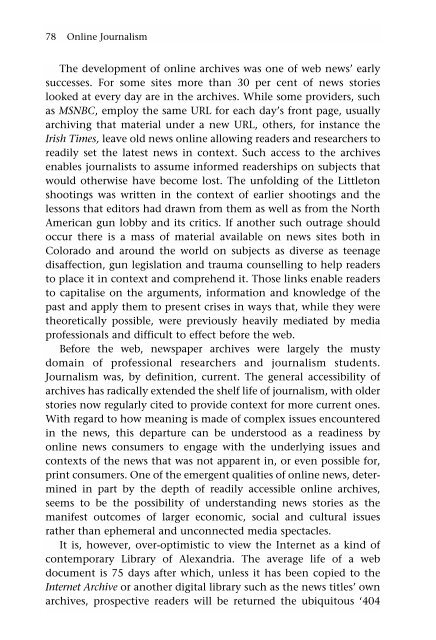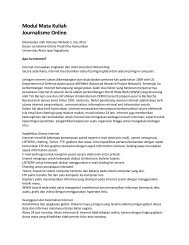Online Journalism - Ayo Menulis FISIP UAJY
Online Journalism - Ayo Menulis FISIP UAJY
Online Journalism - Ayo Menulis FISIP UAJY
Create successful ePaper yourself
Turn your PDF publications into a flip-book with our unique Google optimized e-Paper software.
78 <strong>Online</strong> <strong>Journalism</strong><br />
The development of online archives was one of web news’ early<br />
successes. For some sites more than 30 per cent of news stories<br />
looked at every day are in the archives. While some providers, such<br />
as MSNBC, employ the same URL for each day’s front page, usually<br />
archiving that material under a new URL, others, for instance the<br />
Irish Times, leave old news online allowing readers and researchers to<br />
readily set the latest news in context. Such access to the archives<br />
enables journalists to assume informed readerships on subjects that<br />
would otherwise have become lost. The unfolding of the Littleton<br />
shootings was written in the context of earlier shootings and the<br />
lessons that editors had drawn from them as well as from the North<br />
American gun lobby and its critics. If another such outrage should<br />
occur there is a mass of material available on news sites both in<br />
Colorado and around the world on subjects as diverse as teenage<br />
disaffection, gun legislation and trauma counselling to help readers<br />
to place it in context and comprehend it. Those links enable readers<br />
to capitalise on the arguments, information and knowledge of the<br />
past and apply them to present crises in ways that, while they were<br />
theoretically possible, were previously heavily mediated by media<br />
professionals and difficult to effect before the web.<br />
Before the web, newspaper archives were largely the musty<br />
domain of professional researchers and journalism students.<br />
<strong>Journalism</strong> was, by definition, current. The general accessibility of<br />
archives has radically extended the shelf life of journalism, with older<br />
stories now regularly cited to provide context for more current ones.<br />
With regard to how meaning is made of complex issues encountered<br />
in the news, this departure can be understood as a readiness by<br />
online news consumers to engage with the underlying issues and<br />
contexts of the news that was not apparent in, or even possible for,<br />
print consumers. One of the emergent qualities of online news, determined<br />
in part by the depth of readily accessible online archives,<br />
seems to be the possibility of understanding news stories as the<br />
manifest outcomes of larger economic, social and cultural issues<br />
rather than ephemeral and unconnected media spectacles.<br />
It is, however, over-optimistic to view the Internet as a kind of<br />
contemporary Library of Alexandria. The average life of a web<br />
document is 75 days after which, unless it has been copied to the<br />
Internet Archive or another digital library such as the news titles’ own<br />
archives, prospective readers will be returned the ubiquitous ‘404
















